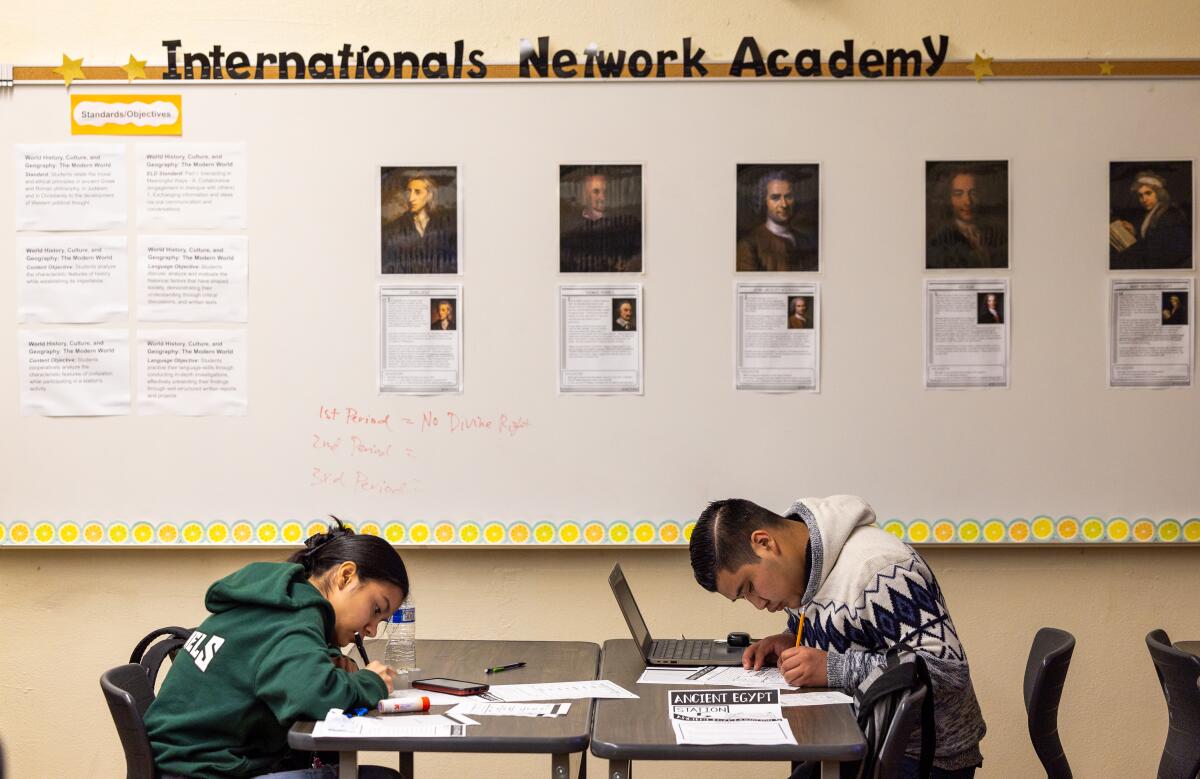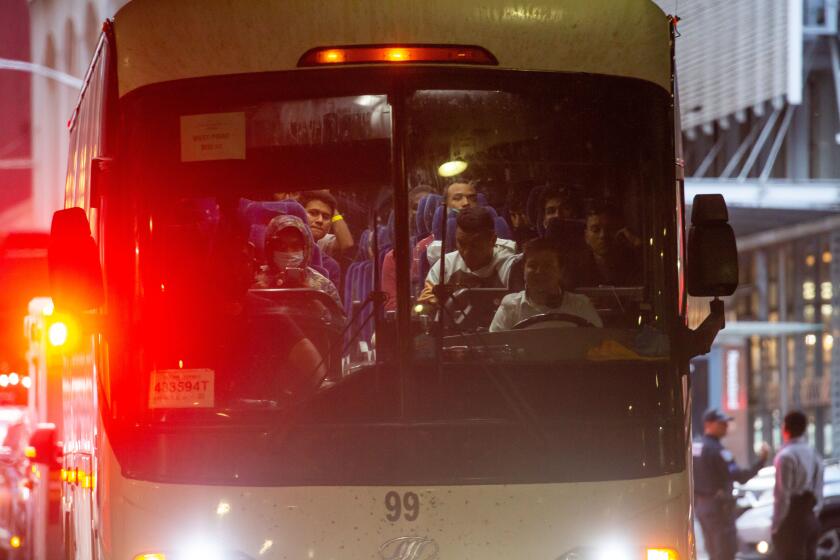Opinion: How anti-immigrant bigotry hugely misunderstands our economy

- Share via
Over recent months, conservative leaders including Donald Trump, House Speaker Mike Johnson and Texas governor Greg Abbott have cynically used pressures at the U.S.-Mexico border to vilify immigrants and refugees fleeing harsh conditions across Latin America and other parts of the world. They’ve pushed fearmongering about immigrants as a threat to skew U.S. policy related to the war in Ukraine and the federal budget.
Some of that anti-immigrant sentiment has spread among voters. But it’s out of touch with the realities of another pre-election concern: the economy, to which noncitizens make increasingly essential contributions. Those contributions seem all the more poignant following the revelation that the maintenance workers who tragically lost their lives in the cargo ship crash at Baltimore’s Francis Scott Key Bridge were hard-working immigrants from Mexico and Central America.
Rather than the current vitriol, we owe immigrant laborers — and immigrant entrepreneurs — a far better deal for their essential role in our economy and way of life.
New data show the increasingly crucial role immigrants play in the economy and the American workforce — especially in California.
According to data compiled by University of Southern California researchers, in 2019 immigrants comprised nearly 30% of the population of the Golden State (which has the fifth-largest economy in the world), contributing more than $100 billion in taxes and $291 billion in spending power. Data from New York shows a similar economic impact: In 2021, immigrant New Yorkers paid $61 billion in taxes and contributed $138 billion in spending power. Nationwide, during the pandemic, immigrants were among the most significant groups of workers who helped keep the economy afloat when others were in lockdown.
In so many ways, noncitizens are a net plus for our nation and its evolving economy. Nevertheless this group, including a large undocumented population, faces significantly higher employment risks than do citizens. According to a 2022 study by researchers at UC Merced, for example, California immigrant workers are overrepresented in high-risk jobs and twice as likely as citizens to work for hourly compensation below the prevailing “living wage.” Such conditions are found across much of the country.
Moreover, much of our country’s innovation is driven by immigrant entrepreneurs and investors. Immigrants launched more than half (55%) of America’s startup companies valued at $1 billion or more, and nearly two-thirds (64%) of billion-dollar companies were founded or co-founded by immigrants or the children of immigrants, according to a 2022 analysis by the National Foundation for American Policy. Our next generation of economic leadership is likely to be shaped by noncitizen entrepreneurs — street vendors, franchisees, founders and venture capitalists alike.
The student’s death on the University of Georgia campus should be seen in the context of violence against women. Studies show no link between immigration and lawlessness.
California has moved slowly but surely over recent years to lead on policies that address the needs and potential of noncitizens. It has provided state benefits for immigrants including eligibility for driver’s licenses, college scholarships, low-income tax credits, direct cash aid during the pandemic and Medi-Cal health coverage. In addition, the state has a new program, Expanding Venture Capital Access, to create a more inclusive venture capital ecosystem (its first investment was in Unshackled Ventures, a fund that invests in immigrant-founded startups and for which one of us works).
Still more can be done. In addition to California’s existing programs and investments, which should be emulated or at least considered around the country, we need stronger labor protections for noncitizens, such as unemployment insurance. Undocumented immigrants should have access to state-administered food stamp benefits and cash assistance for elderly and vulnerable immigrants paid for by their tax dollars.
And finally, some municipalities in California and elsewhere allow noncitizens to vote in local elections that bear directly on their opportunities and well-being. Our nation’s earliest principles stemmed from resistance to taxation without representation. Hardworking immigrants who pay taxes, do essential work and abide by our laws should not be precluded from voting in local and state elections that affect their quality of life, as well as our collective prospects for a future of prosperity and progress.
States shouldn’t get into the business of deportation. Especially if their first step is racial and ethnic profiling.
The best of our nation’s history has kept doors and minds open to the many time-tested contributions immigrants have brought through their hard work and big dreams. What we should really fear is what our country might look like if we reject this rich tradition of inclusion and fairness.
Henry A. J. Ramos is a senior fellow at the New School Institute on Race, Power and Political Economy. Angelica Salas is executive director of the Coalition for Humane Immigrant Rights in Los Angeles and a trustee of the California Wellness Foundation. C. M. Samala is head of community & culture at Unshackled Ventures.













